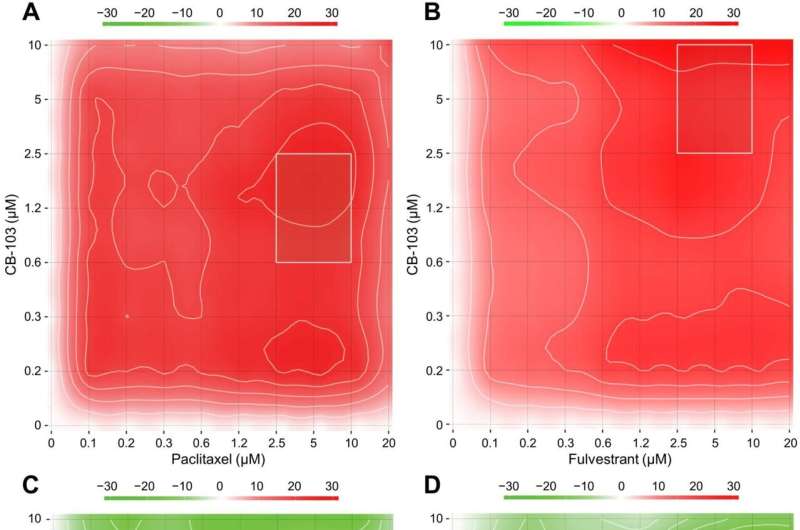This article has been reviewed according to Science X's editorial process and policies. Editors have highlighted the following attributes while ensuring the content's credibility:
fact-checked
trusted source
proofread
Research suggests a new approach for treatment-resistant breast cancers

A collaborative study between LSU Health New Orleans School of Medicine, the University of Rochester and Cellestia Biotech AG, a biopharmaceutical company headquartered in Basel, Switzerland, provides compelling evidence that combining an investigational oral drug with standard-of-care medications reverts hormone resistance and increases Rx effectiveness in experimental models of estrogen-receptor positive (ER+) and triple-negative breast cancers (TNBC), respectively. The findings are published in Cancers journal.
CB-103 is a small molecule Notch inhibitor invented by Cellestia. Notch receptors relay information from the cell surface to the genes, and Notch signaling plays an important role in many different cancers, including breast cancers, where its role was originally demonstrated by the Miele laboratory. Based on their prior research, the LSU Health team believed this compound should be safe and effective in hormone-resistant estrogen-receptor-positive breast cancers and proposed the study for this indication to Cellestia.
"Over the past two decades, various drugs targeting the Notch signaling axis have been investigated," notes senior author Lucio Miele, MD, Ph.D., Professor and Chair of Genetics and Assistant Dean for Translational Science at LSU Health New Orleans School of Medicine. "CB-103 is a next-generation, orally active, clinical-stage drug that, unlike older drugs, directly targets gene regulation by Notch and offers a much-improved toxicity profile."
"The safety and efficacy of CB-103 in Notch-dependent advanced, metastatic solid, or hematological malignancies have been investigated in a multi-center international phase I/II clinical trial," adds Samarpan Majumder, Ph.D., Assistant Professor of Genetics at LSU Health New Orleans School of Medicine and one of the senior authors of the paper. "CB-103 has been safe and well-tolerated, showing minimal gastrointestinal toxicity, unlike previous Notch inhibitors."
Despite recent advances in the treatment of estrogen-receptor-positive breast cancers, endocrine resistance ultimately develops. Available second-line therapies are moderately effective but can have significant toxicities, and third-line therapies are generally largely ineffective.
Triple-negative breast cancer is an aggressive breast cancer subtype that accounts for 15−25% of all breast cancer diagnoses in Western countries. Patients with early TNBC have a two- to three-fold higher risk of disease recurrence and death in the first three years after diagnosis. TNBC disproportionately affects young premenopausal women and African American women.
"Our translational data will be serving as a foundation for planned clinical trials where we will combine CB-103 with anti-estrogen therapy in ER+ breast cancers and with taxanes like taxol or docetaxel in TNBC," concludes Dr. Majumder.
More information: Michele Vigolo et al, The Efficacy of CB-103, a First-in-Class Transcriptional Notch Inhibitor, in Preclinical Models of Breast Cancer, Cancers (2023). DOI: 10.3390/cancers15153957




















